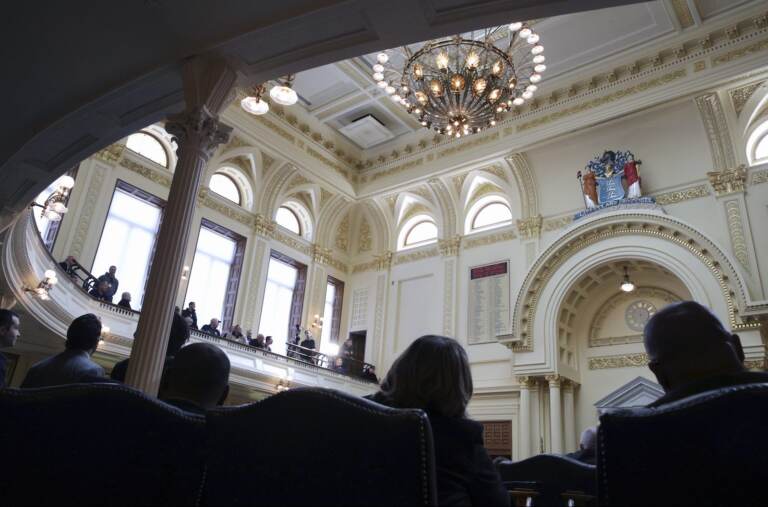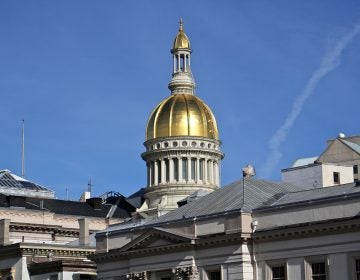Spending N.J.’s $9 billion budget surplus: GOP says it’s been shut out of the process
Republicans want to do more with the state’s unexpected surplus. They’ve proposed tax relief called “Give It Back”: $4 billion in rebates to 4 million residents.

The Statehouse in Trenton, N.J. is pictured in this file photo. (Mel Evans/AP Photo)
With a little more than a week until New Jersey state lawmakers must pass this year’s budget, some Republican lawmakers said their proposals for tax relief haven’t been considered by a Democratic-leaning legislature.
And some have even suggested that they’ve been shut out of the process almost entirely.
“Nobody really knows … the major budget decisions all happen in a backroom with very few people there,” said Sen. Declan O’Scanlon (R-Monmouth), who serves as the Republican Budget Officer in the state Senate.
“We’re going to see [the budget] on the 27th and then vote for it on the 29th, two days later,” O’Scanlon said. “That’s the saddest part of the whole thing. I don’t really know. And there’s zero transparency. For the $50 billion budget, two days is not enough for anybody to actually go through, and really know what’s in it and how it’s allocated.”
Both parties have different budget priorities
Top Democrats, including Gov. Phil Murphy, have touted the new ANCHOR program, a $2 billion property tax relief plan. Based on the existing Homestead rebate program, they said it would impact 2 million households (5.5 million residents).
Under the Democrats’ plan, homeowners making less than $150,000 will receive a tax credit of $1,500 on their taxes next year, while those making $150,000 to $250,000 will receive a tax credit of $1,000.
“In 2021, the average New Jersey property tax bill was about $9,300,” Murphy said at a press conference announcing details about ANCHOR last Wednesday. “For middle-class families, getting that $1,500 in direct relief, that average bill will effectively become $7,800.”
Republicans said they want to do more with the state’s unexpected $9 billion surplus.
They’ve proposed a tax relief program called “Give It Back,” which they said would expeditiously spend nearly $4 billion on rebates to four million residents. They have, on multiple occasions this session, sought a full Senate vote on the package.
Under the GOP plan, taxpayers whose gross income for 2021 was less than $500,000 would receive a refundable tax credit. Individuals and married couples who filed their taxes separately would receive $500 and married couples who filed jointly would receive $1,000.
O’Scanlon also said Republicans want to pay off the state’s deficit sooner, while Murphy has indicated he wants to hang onto some of the funding as economists predict a looming recession.
“The ANCHOR program is not worth the paper it’s printed on,” O’Scanlon said. “It takes a year for any taxpayers to see any of their money that we have over collected, to the tune of $9 billion. There’s no reason why we shouldn’t be giving that money back immediately.”
Micah Rasmussen, executive director at the Rebovich Institute for New Jersey Politics, said it’s difficult for the two parties to come to a consensus because they have different priorities.
“The biggest difference I see is that the Republican proposal is broader and bigger,” Rasmussen said. “Democrats are looking to do other things with the extra funds that are available right now. They’re looking to keep it around for other budget priorities as well. And they’re looking to hang onto it, because they know that this is a one-shot deal. They know that this is not something where this level of revenue will be sustained over the long term.”
Affordability and tackling property taxes
Affordability has been a key issue in Trenton for both major parties this year. New Jersey has some of the highest property taxes in the nation.
After a surprisingly narrow gubernatorial race in last year’s general election, Republicans claimed that Democrats received a wake-up call as it relates to making the state more affordable, and that the minority party had been ringing the alarm about the state’s high cost of living for years.
O’Scanlon said that in past years Republicans had hoped to address the issue through an alternate budget plan, including legislation that would ensure more money from the Energy Tax Receipts Property Tax Relief Fund makes its way back to municipalities.
Revenue from the fund, which comes from state taxes on utility companies, is supposed to trickle back down to municipalities and help them avoid needing to raise property taxes. However, since 2008, about $14 billion has been diverted to the state’s general fund by both Republican and Democratic administrations to pay for other priorities.
As a result, some towns and cities have increased property taxes or cut back on public services, according to the New Jersey League of Municipalities.
Under this bill, the fund would have to send $331 million dollars to municipalities over the course of four years, beginning in fiscal year 2023.
Assemblyman Jay Webber (R-Morris) reintroduced the measure at the beginning of the current legislative session, and said it had bipartisan support. During last Thursday’s voting session, he sought a full Assembly vote on the bill. Though, lawmakers elected not to act on it.
“My position … is let’s keep the hands off the money of taxpayers in the first place. If you’ve overtaxed us by $10 billion, just cut the tax rate. Let us keep the money and stop taking it from us,” Webber said.
Lawmakers have removed Webber as the primary sponsor in favor of a virtually identical measure introduced by Assemblyman Dan Benson (D-Mercer). The Senate has already passed its version of the bill, introduced by Sen. Troy Singleton (D-Burlington).
Some Republicans have indicated that it was an example of Democrats wanting to take credit for their ideas, in an effort to score political points.
Rasmussen called it “gamesmanship” in the political process, and said, in general, that it happens at every level of government despite the majority party.
“This is something that is a valid complaint. But it’s also true of any legislative majority,” Rasmussen said. “When you have a majority party that needs the minority party’s votes, then they will be taken seriously, and they will be treated as partners. And they will be brought into the process. When you don’t need their votes, when you can pass a budget without them, they are going to be kept to the side, and they are going to not be allowed to have political advantage.”
Singleton said he’s not familiar with the differences between Webber’s bill and Benson’s version, but said he believes a deal will be worked out.
“I think they have to reconcile their bills,” Singleton said. “I think the proposal that passed the Senate by a 39-0 vote is the bill that hopefully they will come around to an agreement up on over in the Assembly, and we’ll be able to get it to the governor’s desk.”
Richard McGrath, a spokesperson for Senate Democrats, said the caucus declined to comment on Republican criticism of the budget process.
State lawmakers must pass a budget before July 1 to avoid a government shutdown.
WHYY is your source for fact-based, in-depth journalism and information. As a nonprofit organization, we rely on financial support from readers like you. Please give today.








